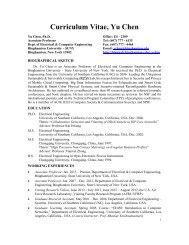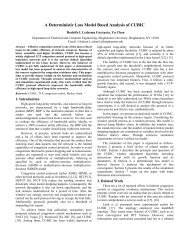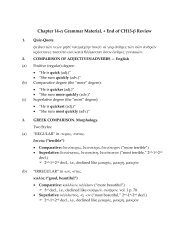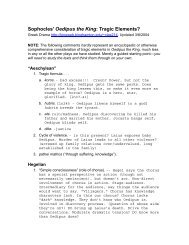Aristotle Poetics - Harvey.binghamton.edu
Aristotle Poetics - Harvey.binghamton.edu
Aristotle Poetics - Harvey.binghamton.edu
Create successful ePaper yourself
Turn your PDF publications into a flip-book with our unique Google optimized e-Paper software.
<strong>Aristotle</strong> <strong>Poetics</strong> 12<br />
there are some without a single known name, for instance Agathon’s Antheus, in which<br />
both incidents and names are of the poet’s invention; and it is no less delightful on that<br />
account. So that one must not aim at a rigid adherence to the traditional stories on which<br />
tragedies are based. It would be absurd, in fact, to do so, as even the known stories are<br />
only known to a few, though they are a delight none the less to all.<br />
10<br />
It is evident from the above that the poet (poietes) must be more the maker (poietes) 57 of<br />
his plots than of his verses, inasmuch as he is a poet by virtue of the imitative element in<br />
his work, and it is actions that he imitates. And if he should come to take a subject from<br />
actual history, he is none the less a poet for that; since some historic occurrences may<br />
very well be in the probable and possible order of things; and it is in that aspect of them<br />
that he is their poet. 58<br />
Of simple plots and actions the episodic are the worst. I call a plot episodic when there is<br />
neither probability nor necessity in the sequence of episodes. Actions of this sort bad poets<br />
construct through their own fault, and good ones on account of the players. His work<br />
being for public performance, a good poet often stretches out a plot beyond its capabilities,<br />
and is thus obliged to twist the sequence of incident.<br />
20<br />
Tragedy, however, is an imitation not only of a complete action, but also of incidents<br />
arousing pity and fear. Such incidents have the very greatest effect on the mind when they<br />
occur unexpectedly and at the same time in consequence of one another; there is more of<br />
the marvelous in them then than if they happened of themselves or by mere chance. Even<br />
matters of chance seem most marvelous if there is an appearance of design as it were in<br />
them. So, for instance, the statue of Mitys at Argos killed the killer of Mitys’ by falling<br />
down on him when the latter was viewing it. For incidents like that we think to be not<br />
without a meaning. 59 A plot, therefore, of this sort is necessarily finer than others.<br />
10<br />
30<br />
Plots are either simple or complex, since the actions they represent are naturally of this<br />
twofold description. The action, proceeding in the way defined, as one continuous whole,<br />
I call simple, when the change in the hero’s fortunes takes place without peripeteia (reversal)<br />
or anagnorisis (recognition; see above, note 48); and complex, when it involves<br />
one or the other, or both. These should each of them arise out of the structure of the plot<br />
itself, so as to be the consequence, necessary or probable, of the antecedents. There is a<br />
great difference between a thing happening after something else, and because of something<br />
else.<br />
11<br />
57 Greek poietes means “creator,” “maker,” “author, “poet.”<br />
58 We know of at least three tragedies, all three early, on historical themes:<br />
Phrynichus’ Capture of Miletus and Phoenician Women, and Aeschylus’ Persians.<br />
59 This Mitys seems to have been a real person from <strong>Aristotle</strong>’s time, perhaps from<br />
the city of Argos; he may have fallen victim to political violence.















